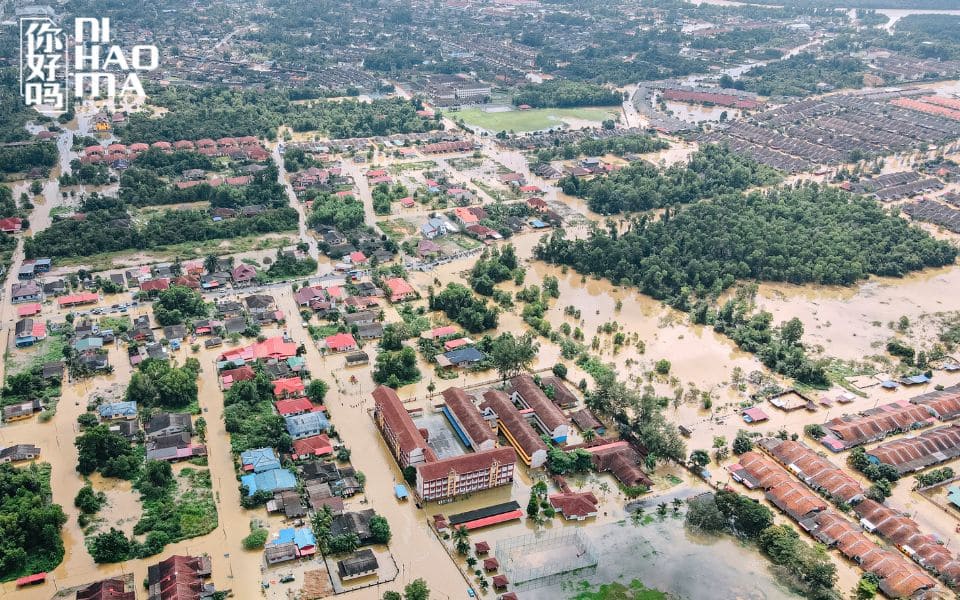Learning weather in Chinese not only helps you understand weather forecasts but also enriches your vocabulary for everyday conversations. When chatting with native speakers, talking about the weather is always an easy, natural, and friendly way to start a conversation. In this guide, we’ll explore over 60+ Chinese weather words and practical conversation examples to help you speak more confidently and naturally in Mandarin.
Vocabulary about weather in Chinese
With the topic weather in Chinese, let’s take a look at essential words and expressions used to describe common weather conditions in daily life. These are fundamental vocabulary items that help you describe the weather, express how you feel, or take part in natural conversations in Chinese.
| Chinese (汉字) | Pinyin | Meaning |
|---|---|---|
| 白天 | báitiān | Daytime |
| 黑夜 | hēiyè | Night |
| 潮湿 | cháoshī | Humid |
| 干燥 | gānzào | Dry |
| 高温 | gāowēn | High temperature |
| 冷 | lěng | Cold |
| 冰冻 | bīngdòng | Frozen |
| 和风 | héfēng | Gentle breeze |
| 热 | rè | Hot |
| 凉快 | liángkuai | Cool |
| 雷雨 | léiyǔ | Thunderstorm |
| 暖和 | nuǎnhuo | Warm |
| 气候 | qìhòu | Climate |
| 下雨 | xiàyǔ | To rain |
| 下雪 | xiàxuě | To snow |
| 阴 | yīn | Overcast |
| 晴天 | qíngtiān | Sunny day |
| 阴天 | yīntiān | Cloudy day |
| 有雾 | yǒu wù | Foggy |
| 有风 | yǒu fēng | Windy |
| 有雷 | yǒu léi | Thunder |
| 天气预报 | tiānqì yùbào | Weather forecast |
| 炎热 | yánrè | Scorching hot |
| 温度 | wēndù | Temperature |
| 彩虹 | cǎihóng | Rainbow |
| 毛毛雨 | máomaoyǔ | Drizzle |
| 中雨 | zhōngyǔ | Moderate rain |
| 大雨 | dàyǔ | Heavy rain |
| 阵雨 | zhènyǔ | Showers |
| 季节 | jìjié | Season |
| 春天 | chūntiān | Spring |
| 夏天 | xiàtiān | Summer |
| 秋天 | qiūtiān | Autumn |
| 冬天 | dōngtiān | Winter |

Weather in Chinese: Natural Disasters Vocabulary
Natural disasters are extreme weather phenomena that often cause serious damage to people and property. Learning Chinese weather vocabulary about natural disasters will help you describe emergency situations, understand news reports, and improve your communication skills in fields such as meteorology and environmental studies.
| Chinese (汉字) | Pinyin | Meaning |
|---|---|---|
| 天灾 | tiānzāi | Natural disaster |
| 灾难 | zāinàn | Catastrophe / Disaster |
| 台风 | táifēng | Typhoon (Western Pacific) |
| 飓风 | jùfēng | Hurricane (Atlantic Ocean) |
| 龙卷风 | lóngjuǎnfēng | Tornado |
| 暴雪 | bàoxuě | Blizzard |
| 雾霾 | wùmái | Smog / Heavy haze |
| 冰雹 | bīngbáo | Hail |
| 干旱 | gānhàn | Drought |
| 洪水 | hóngshuǐ | Flood |
| 森林火灾 | sēnlín huǒzāi | Forest fire |
| 山洪 | shānhóng | Flash flood |
| 滑坡 | huápō | Landslide |
| 地震 | dìzhèn | Earthquake |
| 海震 | hǎizhèn | Submarine earthquake |
| 风暴潮 | fēngbàocháo | Storm surge |
| 余震 | yúzhèn | Aftershock |
| 海啸 | hǎixiào | Tsunami |
| 火山爆发 | huǒshān bàofā | Volcanic eruption |
| 干热风 | gān rè fēng | Hot, dry wind |
| 火灾 | huǒzāi | Fire |
| 寒潮 | háncháo | Cold wave / Cold front |
| 沙暴 | shābào | Sandstorm |
| 雪崩 | xuěbēng | Avalanche |

Weather in Chinese: The 24 Solar Terms
In Chinese culture, the 24 solar terms (节气 – jiéqì) are time markers that divide the solar year into 24 equal parts. They reflect changes in weather, climate, agriculture, and human activity. This ancient system originated during the Zhou Dynasty and was perfected in the Han Dynasty. It helped farmers determine when to sow seeds, harvest crops, and prepare for droughts or cold spells.
In the philosophy of Yin–Yang and the Five Elements, each solar term represents the harmonious interaction between humans and nature. Ancient Chinese people believed that “to follow nature’s timing is to live in peace with all things.” Understanding and living in accordance with the solar terms was thought to promote good health, abundant harvests, and social harmony.
Today, the 24 solar terms are not only an ancient time-keeping method but also a vital part of China’s intangible cultural heritage, symbolizing the deep bond between humans and the natural world.
| Chinese (汉字) | Pinyin | English Name | Description |
|---|---|---|---|
| 立春 | Lìchūn | Beginning of Spring | Marks the start of spring as temperatures begin to rise. |
| 雨水 | Yǔshuǐ | Rain Water | Increased rainfall signals a humid spring. |
| 惊蛰 | Jīngzhé | Awakening of Insects | The first spring rains arrive; nature comes back to life. |
| 春分 | Chūnfēn | Spring Equinox | Day and night are of equal length, the midpoint of spring. |
| 清明 | Qīngmíng | Clear and Bright | Skies clear and temperatures warm; also a time for ancestor worship. |
| 谷雨 | Gǔyǔ | Grain Rain | Ideal rainfall helps grains grow—an important time for farmers. |
| 立夏 | Lìxià | Beginning of Summer | The start of summer as temperatures rise quickly. |
| 小满 | Xiǎomǎn | Lesser Fullness of Grain | Crops are growing well but not yet ready for harvest. |
| 芒种 | Mángzhòng | Grain in Ear | Suitable for planting crops with awns or seed husks. |
| 夏至 | Xiàzhì | Summer Solstice | The longest day and shortest night of the year. |
| 小暑 | Xiǎoshǔ | Minor Heat | The weather starts to get hot but is not at its peak. |
| 大暑 | Dàshǔ | Major Heat | The hottest period of the year. |
| 立秋 | Lìqiū | Beginning of Autumn | Marks the arrival of autumn as the air cools. |
| 处暑 | Chǔshǔ | End of Heat | The summer heat gradually fades away. |
| 白露 | Báilù | White Dew | Dew appears at night as temperatures drop between day and night. |
| 秋分 | Qiūfēn | Autumn Equinox | Day and night are equal again, halfway through autumn. |
| 寒露 | Hánlù | Cold Dew | Dew becomes colder; the air turns crisp and dry. |
| 霜降 | Shuāngjiàng | Frost’s Descent | Frost begins to appear as temperatures fall sharply. |
| 立冬 | Lìdōng | Beginning of Winter | The start of the cold winter season. |
| 小雪 | Xiǎoxuě | Minor Snow | The first light snow begins to fall. |
| 大雪 | Dàxuě | Major Snow | Heavier snowfall and colder weather. |
| 冬至 | Dōngzhì | Winter Solstice | The longest night and shortest day of the year. |
| 小寒 | Xiǎohán | Minor Cold | Cold weather arrives but not yet at its harshest. |
| 大寒 | Dàhán | Major Cold | The coldest time of the year, marking the end of the solar cycle. |
Common Chinese Weather Phrases for Everyday Conversation
Weather in Chinese is one of the most common and natural conversation topics. It’s a great way to start small talk with native speakers. Knowing how to ask questions like “How’s the weather today?”, “Is it raining?”, or “What’s the temperature?” will make your Mandarin conversations sound more fluent and friendly.
Below are some useful Chinese weather expressions and sentences to help you talk about the weather naturally in daily life.
| Chinese (汉字) | Pinyin | Meaning |
|---|---|---|
| 今天天气怎么样? | Jīntiān tiānqì zěnmeyàng? | How’s the weather today? |
| 今天天气很好。 | Jīntiān tiānqì hěn hǎo. | The weather is great today. |
| 今天有点儿热。 | Jīntiān yǒu diǎnr rè. | It’s a bit hot today. |
| 今天很冷。 | Jīntiān hěn lěng. | It’s very cold today. |
| 今天挺暖和的。 | Jīntiān tǐng nuǎnhuo de. | It’s quite warm today. |
| 天气真好! | Tiānqì zhēn hǎo! | What a beautiful day! |
| 天气太糟了! | Tiānqì tài zāo le! | The weather is terrible! |
| 外面下雨了。 | Wàimiàn xià yǔ le. | It’s raining outside. |
| 雨停了。 | Yǔ tíng le. | The rain has stopped. |
| 天气预报说今天有雨。 | Tiānqì yùbào shuō jīntiān yǒu yǔ. | The weather forecast says it’ll rain today. |
| 明天会下雪。 | Míngtiān huì xià xuě. | It will snow tomorrow. |
| 今天多少度? | Jīntiān duōshao dù? | What’s the temperature today? |
| 气温在三十度左右。 | Qìwēn zài sānshí dù zuǒyòu. | The temperature is around 30 degrees. |
| 今天比昨天冷多了。 | Jīntiān bǐ zuótiān lěng duō le. | It’s much colder than yesterday. |
| 天气越来越冷了。 | Tiānqì yuè lái yuè lěng le. | It’s getting colder and colder. |
| 我不喜欢太热的天气。 | Wǒ bù xǐhuān tài rè de tiānqì. | I don’t like hot weather. |
| 你带伞了吗? | Nǐ dài sǎn le ma? | Did you bring an umbrella? |
| 雾太大了,看不清路。 | Wù tài dà le, kàn bù qīng lù. | The fog is so thick that I can’t see the road clearly. |
You might also like: Basic Chinese Phrases for Beginners

Sample conversation about weather in Chinese
When learning Mandarin, the topic of weather in Chinese is one of the most practical and commonly used in daily conversations. Below is a short, natural dialogue that includes useful Chinese weather vocabulary — perfect for you to study and practice at home.
A: 今天天气怎么样?
Jīntiān tiānqì zěnme yàng?
How’s the weather today?
B: 挺好的,阳光很充足,不过有点儿热。
Tǐng hǎo de, yángguāng hěn chōngzú, búguò yǒu diǎnr rè.
Pretty nice! It’s sunny, but a little hot.
A: 是啊,昨天还挺凉快的,今天突然就三十多度了。
Shì a, zuótiān hái tǐng liángkuai de, jīntiān tūrán jiù sānshí duō dù le.
Yeah, it was cool yesterday, but suddenly it’s over 30 degrees today!
B: 我早上看天气预报,说下午可能会下雷阵雨。
Wǒ zǎoshang kàn tiānqì yùbào, shuō xiàwǔ kěnéng huì xià léizhènyǔ.
I saw the weather forecast this morning — it said there might be a thunderstorm this afternoon.
A: 真的吗?那我出门要带伞了。
Zhēn de ma? Nà wǒ chūmén yào dài sǎn le.
Really? Then I’d better bring an umbrella when I go out.
B: 对啊,最近天气变化很快,一会儿晴一会儿雨。
Duì a, zuìjìn tiānqì biànhuà hěn kuài, yíhuìr qíng yíhuìr yǔ.
Yeah, the weather has been changing so fast lately — sunny one moment and rainy the next.
A: 希望晚上不要下雨,我想去公园散步。
Xīwàng wǎnshang bú yào xià yǔ, wǒ xiǎng qù gōngyuán sànbù.
I hope it doesn’t rain tonight — I want to take a walk in the park.
B: 也许到晚上就凉快多了。
Yěxǔ dào wǎnshang jiù liángkuai duō le.
Maybe it’ll be much cooler by evening.
Conclusion
Through this lesson from Ni Hao Ma, you’ve learned not only essential vocabulary about weather in Chinese, but also how to apply it naturally in real-life conversations. These words and expressions form a solid foundation for speaking confidently about the weather — one of the easiest and most common topics in daily Mandarin communication. Keep practicing these dialogues and use them in real-life situations to improve your fluency and speaking confidence!



